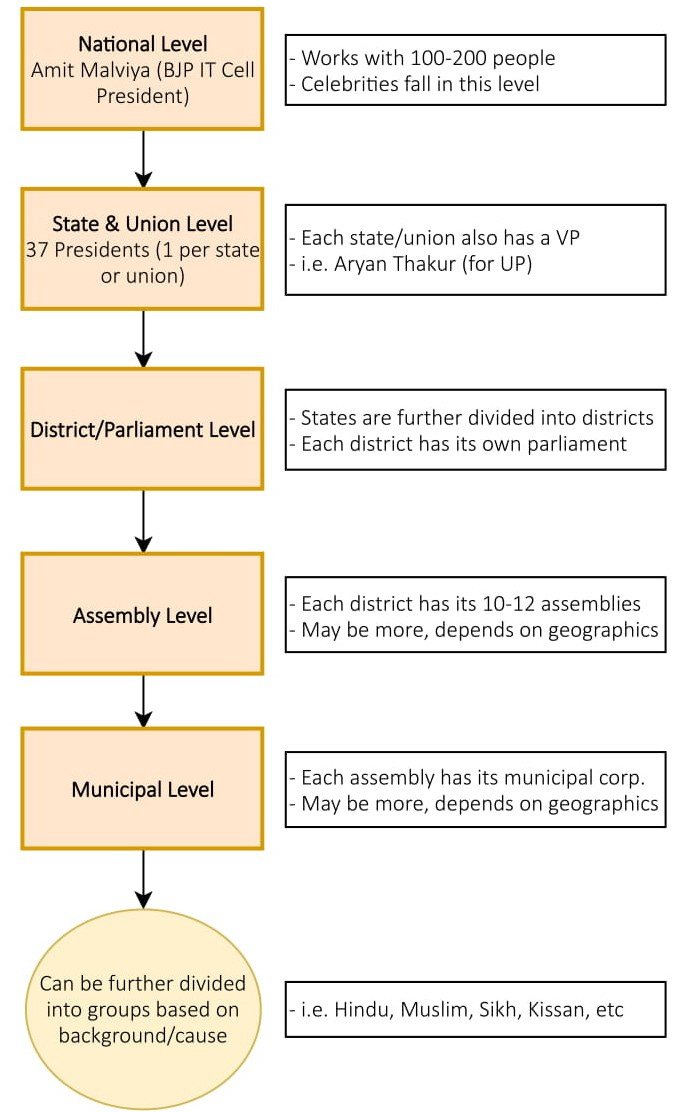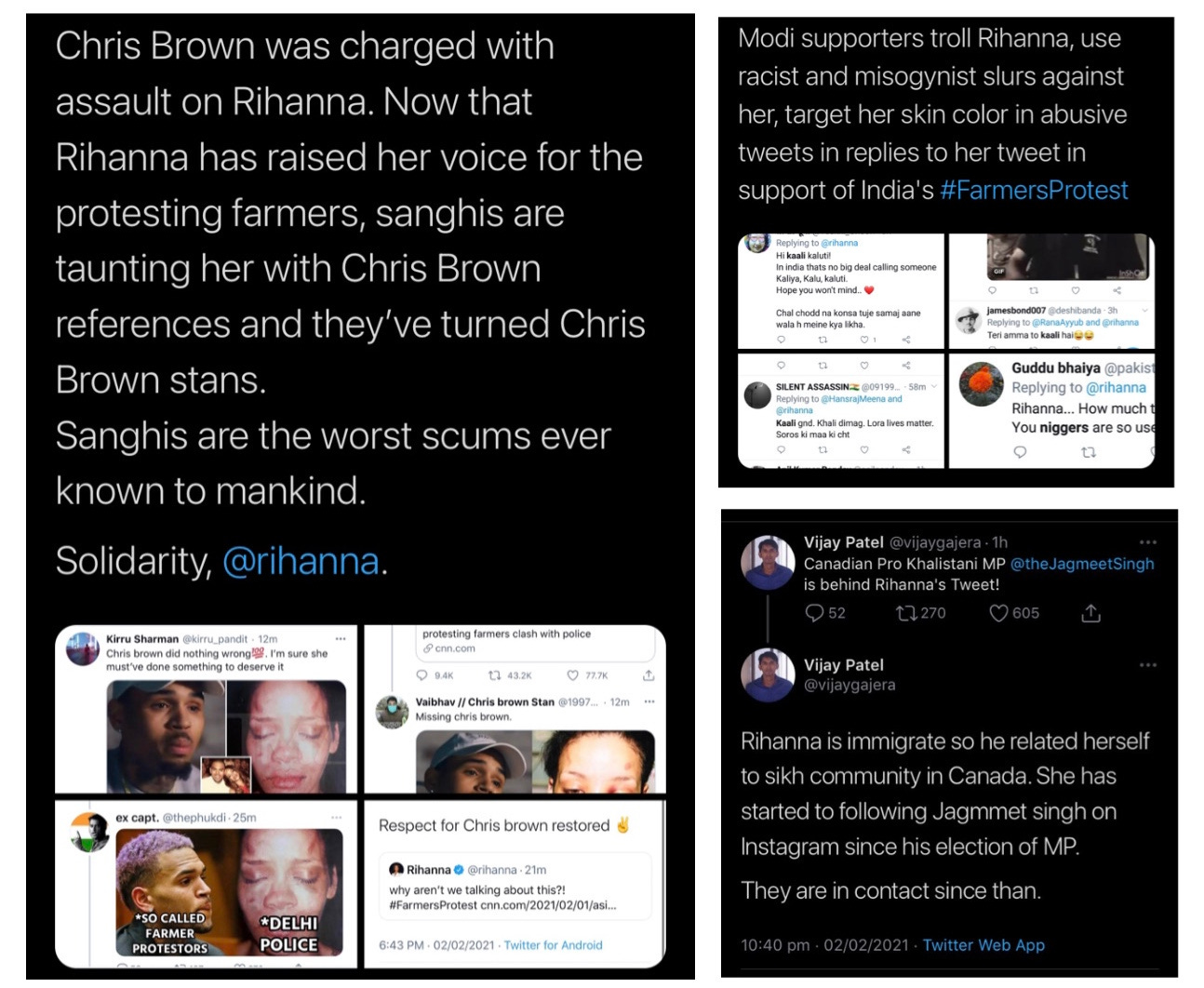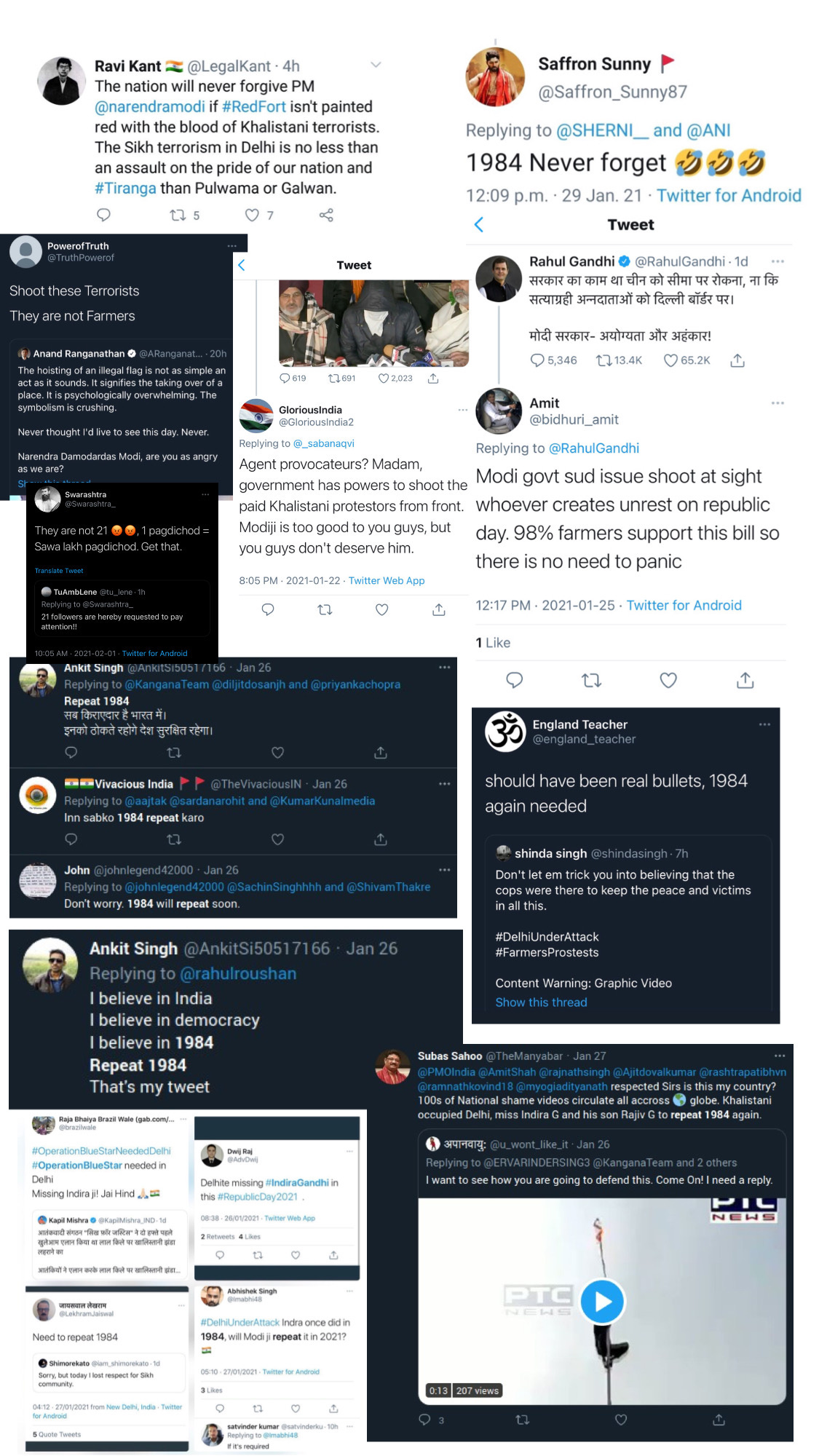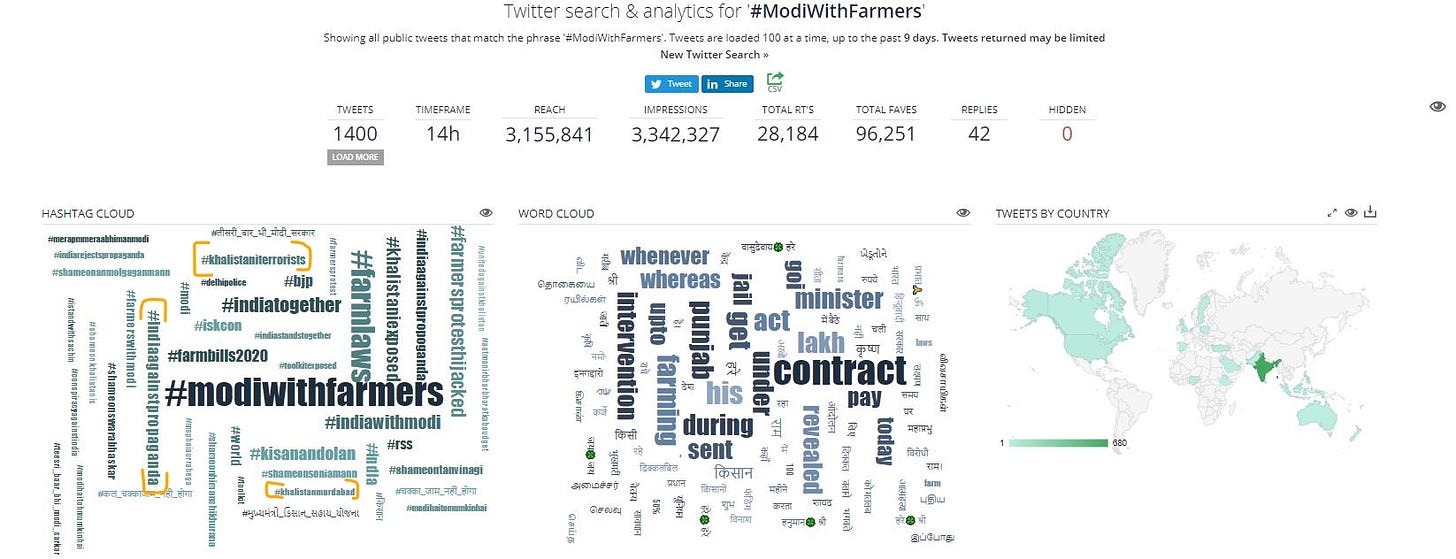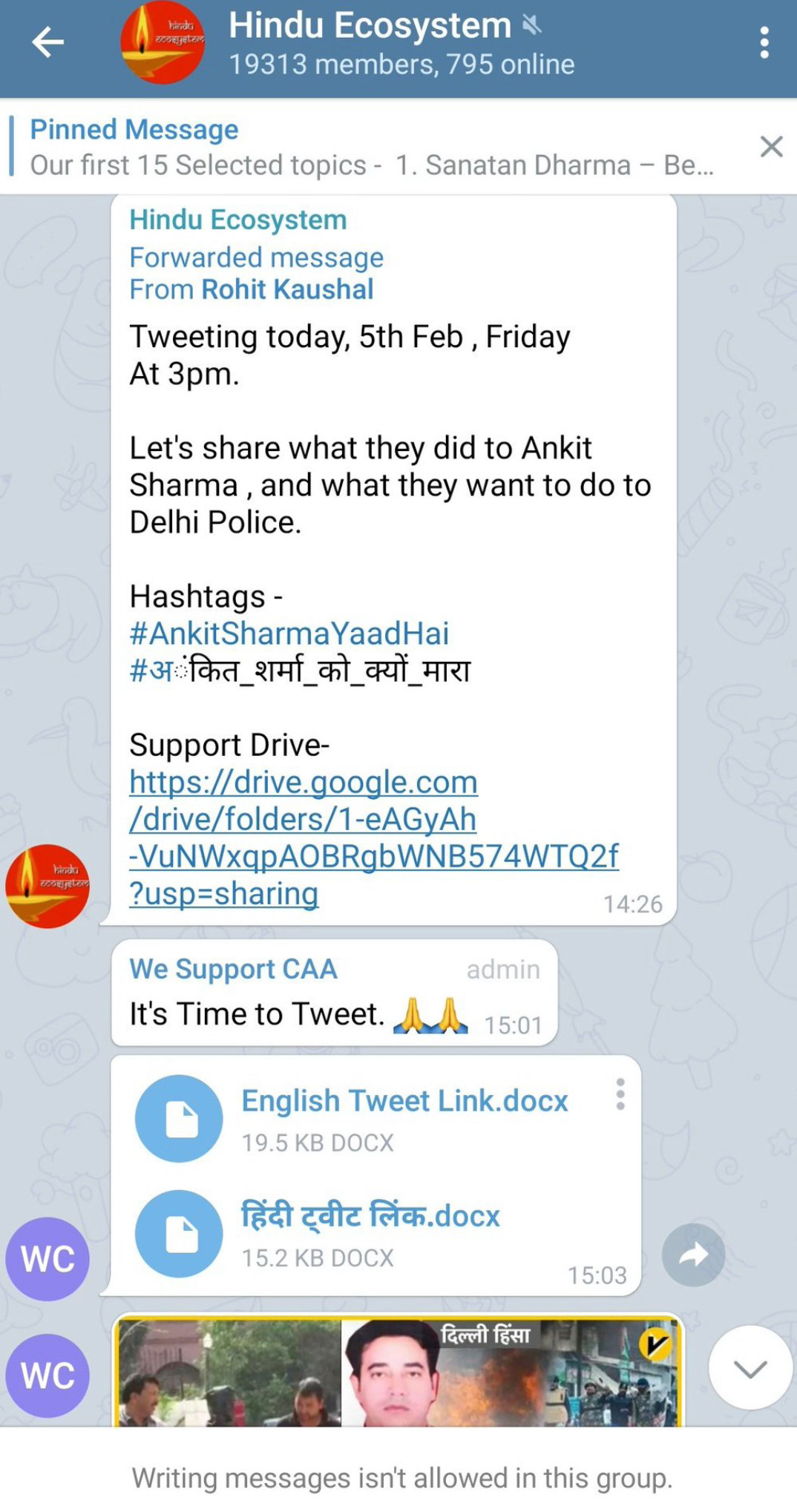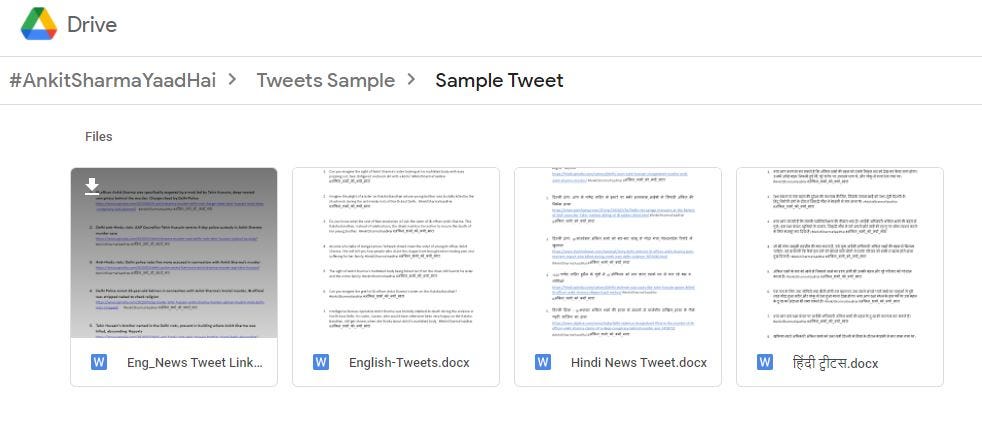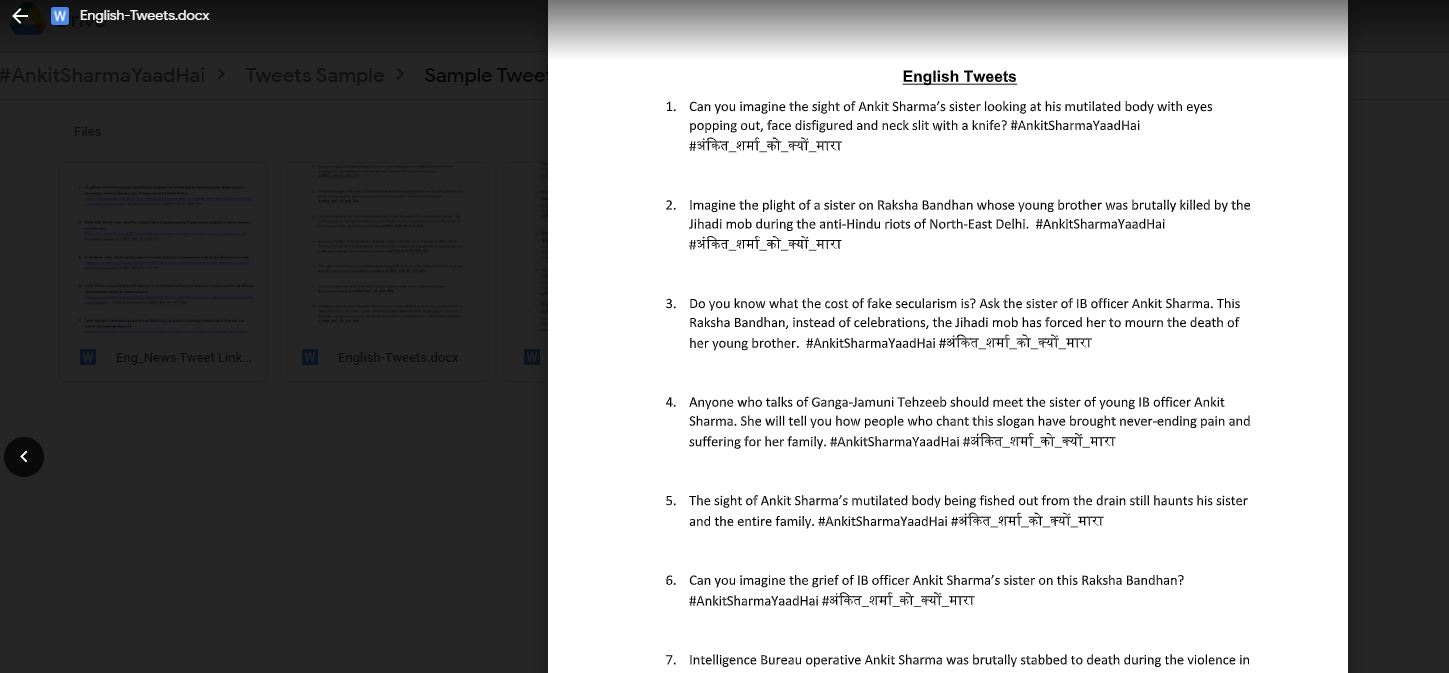Mansi Kaur: Former Members Disclose How The BJP IT Cell Is Targeting The Farmers Protest
They slowly realized how comfortable other cell members were with spreading disinformation and targeting people’s faiths to invoke a response
Mansi Kaur
February 8, 2021 | 6 min. read
For the last several months, farmers, workers, and unions in India have been peacefully protesting against new agriculture laws put in place by the BJP government.
While the protest occurring at the border of Delhi drives mainstream coverage, the digital space has played a critical role in shaping the debate.
If you are one of the many in the diaspora tweeting in support of the farmers’ protest you have likely received abusive replies, brigading, and threats from accounts that look and sound eerily similar to one another. Usually newer handles with few followers, a display picture of Hindu historical or religious significance, and broken English tweets.
Congratulations, you probably came up against one of the most feared machinery in the Indian political world - the BJP Information Technology Cell (BJP IT Cell).
In attempts to influence the narrative of politically sensitive topics in India and abroad, governments mass implement IT cells to push forth digital propaganda, while diminishing voices and suppressing dissent. Different political parties run IT cells under the pretext of political campaigns. However, the BJP has the largest in quantity. As the Logical Indian Crew found, “for each pro-Congress account spreading propaganda and fake news on Twitter, there are 120 doing the same for the BJP.”
To fully understand how the BJP IT Cell operates, I spoke with two former and one current cell member, all of whom I came across on Twitter. Their names have been changed to protect their identities.
In conversation with the former employees, I was quickly able to understand the reasoning behind their decisions - including why they joined and why they quit.
Yuvraj and Deepak both shared a common sentiment; their resignation stemmed from the belief that “the party wasn’t the same anymore”.
The two joined the BJP several years back as “regular members”, with the aim to go further into politics and hopefully earn a nomination to run - a common motivation amongst employees. Being active BJP volunteers, both were quickly noticed by the likes of Kapil Mishra and other district parliament level heads, from whom they were given further tasks and responsibilities.
They however slowly realized how comfortable other cell members were with spreading disinformation and targeting people’s faiths to invoke a response.
Everyone has a breaking point, as Yuvraj shared with me, “I couldn’t handle seeing the filth they spread, there needs to be a limit somewhere”.
On the contrary, while speaking to the current IT Cell employee, Rajesh, I immediately recognized a sense of loyalty to both job and party - which could also explain why they blocked me after I asked my third question. However, before that happened, he shared that the BJP has over 37 crores (370 million) volunteers and he takes “pride in being part of India's largest party”.
The BJP is one of the two major Indian political parties – the other being India’s Congress. Their policies reflect Hindu nationalist positions, with the party and Modi having close ties to the Rashtriya Swayamsevak Sangh (RSS) – a radical right-wing Hindu supremacist organization part of the larger Sangh Parivar.
During my calls with the two former employees, I was able to uncover the full-fledged hierarchical breakdown of the cells, for example:
In Delhi, there are seven district parliaments, 10 assemblies per district, and four municipal corporations per assembly, resulting in 280 cells at the municipal level.
In Punjab, there are 13 district parliaments, nine assemblies per district, and approximately two municipal corporations per assembly, resulting in nearly 303 cells at the municipal level.
In UP, there are 80 district parliaments, five assemblies per district, and approximately one municipal corporation per assembly, resulting in nearly 538 cells at the municipal level.
At the national level, Amit Malviya has “crores (millions)” working under him and 100-200 alongside him, including celebrities; Deepak went further and explained that “celebrities are given good chunks of money to tweet against the opposition. Kangana, Payal, and others, this is what they’re told to do.”
Cobrapost exposed almost forty Bollywood celebrities as part of Operation Karaoke who were ready to promote a political party by posting favourable messages on their social media accounts for money.
While speaking to Yuvraj, he disclosed to me that the BJP places a “huge emphasis on recruiting minorities, especially Sikhs”. However, to become part of the IT cell, the individual should already be volunteering with the BJP and generally works “their way up the ladder”.
Some members of the IT Cell also work for free as their incentive is obtaining a “party ticket”.
There are also different memberships at various levels. For instance, a basic BJP membership can be obtained through an online form, but “if you want a prime membership, they will do extensive background and family checks, this is mostly if you want to volunteer and work for the party”.
As I was researching, I also came across another former IT cell member, Mahavir. He shared that the IT Cell members have direct access from district level offices to the party head office. Mahavir also revealed that he earned ₹1,000 ($14 USD) per day for the work, but there are several who surpass their daily target of tweets and get a salary equivalent to a government job.
In an interview given to the Youtuber Dhruv Rathee, Mahavir shared that he worked from 2012 to 2015 for the BJP IT Cell. Mahavir, amongst many others, would add terms like ‘Dalit‘, ‘Hindu‘ and ‘Musalman‘ in tweets, irrespective of the topic, as their main job was ‘to troll’.
This was further confirmed during my interviews with Yuvraj and Deepak, “if anyone speaks up against the party, we were told to attack their religion - including farmers.”
This was visibly evident as a response to Sikhs speaking up against India’s mistreatment of the farmers. While some IT Cell members demanded another “1984” Sikh Genocide, others worked to trend hashtags like #ReplaceMovieNamesWithLangar.
Upon voicing their solidarity with the farmers’ protest, international figures like Rihanna, Amanda Cerny, Greta Thunberg, Mia Kalifa, Meena Harris, and others have all been at the receiving end of similar false allegations, violent threats, misogynist and sexist rhetoric, and some have even been labeled terrorists by BJP IT Cell employees.
Going into further detail, I used Social Bearing, a hashtag assessment platform that shows all the public tweets matching a certain phrase.
Some of the most common hashtags to be trended by BJP IT Cell in conjunction with #ModiWithFarmers included #khalistaniterrorists #khalistanmurdabad and #indiaagainstpropaganda, which confirmed what was shared with me - attacking religious sentiments is core to the BJP IT Cell strategy.
By ingraining communal fear in the masses, IT Cell employees seek to instigate citizens against one another and cause a further religious divide.
BJP IT Cells also push content in support of the party through newly created accounts that post the same text and amplify specific hashtags. These influence operations are not singular in nature. They work to distort the narrative on political issues, including but not limited to the farmer’s protest.
In an extensive analysis done by Benjamin Strick, the BJP, through its IT Cell, has been alleged to “exploit online communication methods to influence voters, as well as coordinate influence and automate Twitter activity for hashtag manipulation”. Assessing the data Strick collected, it turns out that a vast majority of these accounts are not actually automated, instead, they are shelf accounts for human use, and are specifically created to amplify certain content.
To verify whether this was the case for the farmers’ protest, I used Hoaxy - a data visualization tool that identifies trends and commonalities between accounts. It uses a ‘bot score’ system to assess the level of automation of an account with five being the highest and zero being little to none.
Upon running a simple query with the #ModiWithFarmers hashtag, more than two-thirds of accounts were found to be human-like. This was further confirmed during an interview with one of the former members, who shared “think of IT cells like a seed and plant, the seeds start the [dis]information and the plants amplify it – these can even be automated depending on the topic or trend.”
In looking at some of these accounts and trends in granular detail, we also get an indication of the type of content. Several accounts use the exact same text; this is known to be the “copypasta” technique.
Yuvraj also further shared details of a “Hindu Ecosystem chat and several other Telegram & WhatsApp groups” that are used to internally communicate amongst cell members and share toolkits. I came across several screenshots of the chat, which shared links to Google Docs.
The referenced Google document from the chat shows suggested tweets for a copypasta network.
The hashtag being promoted in the toolkit document is #AnkitSharmaYaadHai, with pro-Modi and pro-BJP messaging. The contents of the toolkit folder include documents of tweets in English and Hindi. These were then spammed on Twitter by the IT Cell.
As confirmed by Yuvraj and Deepak, parallels can be drawn between this trend and that of #ModiWithFarmers and #IndiaAgainstPropaganda.
IT Cell employees are not interested in engaging in good faith debates or discussions. Their goals are to silence dissent, stoke communal tension, spread disinformation, and manipulate hashtag trends.
This makes the final piece of advice from both Deepak and Yuvraj incredibly important - avoid engaging IT Cell accounts and mass report and block them instead.
Mansi Kaur, based out of Brampton, Canada, currently works within the IT sector. You can find her on Twitter at @mansikaur_
Baaz is home to opinions, ideas, and original reporting for the Sikh and Punjabi diaspora. Support us by subscribing. Find us on Twitter, Instagram, and Facebook at @BaazNewsOrg. If you would like to submit a written piece for consideration please email us at editor@baaznews.org.



